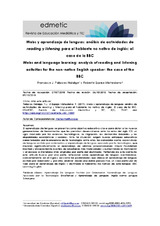Mostrar el registro sencillo del ítem
Webs y aprendizaje de lenguas: análisis de actividades de reading y listening para el hablante no nativo de inglés; el caso de la BBC
| dc.contributor.author | Espejo Mohedano, Roberto | |
| dc.contributor.author | Palacios Hidalgo, Francisco Javier | |
| dc.date.accessioned | 2019-02-18T09:14:35Z | |
| dc.date.available | 2019-02-18T09:14:35Z | |
| dc.date.issued | 2019 | |
| dc.identifier.issn | 2254-0059 | |
| dc.identifier.uri | http://hdl.handle.net/10396/17875 | |
| dc.description.abstract | El aprendizaje de lenguas se presenta como objetivo educativo clave para dotar a las nuevas generaciones de herramientas que les permitan desenvolverse ante los retos del siglo XXI, un siglo marcado por los avances tecnológicos, la migración, las demandas laborales y las disparidades económicas y sociales. Ante tal situación, surgen nuevos enfoques educativos caracterizados por la presencia de la tecnología, entre ellos, los conocidos como «aprendizaje de lenguas asistido por ordenador» y «aprendizaje de lenguas apoyado por la tecnología», que mejoran significativamente el aprendizaje de idiomas proporcionando mayor flexibilidad, libertad y eficacia frente a estilos de enseñanza más tradicionales y aumentando la motivación y el acceso a materiales más originales por parte del alumnado. Partiendo de este contexto, este artículo busca, por una parte, reflexionar sobre aprendizaje de lenguas (centrándose, concretamente, en el inglés), así como las posibilidades que ofrece el aprendizaje de lenguas asistido por ordenador y, por otra, analizar, desde una doble perspectiva, un caso particular de web para el aprendizaje de inglés y destinada a hablantes no nativos de esta lengua: BBC Learning English. | es_ES |
| dc.description.abstract | Language learning has become a key educational objective for providing new generations with tools that allow them to cope with the challenges of the 21st century, a time marked by technological advances, migration, professional demands and economic and social disparities. Bearing in mind such conditions, new educational approaches characterized by the presence of technology (CALL -Computer Assisted Language Learning- and TELL -Technology-Enhanced Language Learning- among them) are emerging and making language teaching significantly better than in the past by providing greater flexibility, freedom and efficiency, as well as increasing students’ motivation and possibilities to access original materials. In this light, this paper aims, on the one hand, to reflect on language learning (focusing, specifically, on English), along with the possibilities offered by computer-assisted language learning; and, on the other, to analyse from a double perspective a particular web for learning English directed to non-native speakers of this language: BBC Learning English. | es_ES |
| dc.format.mimetype | application/pdf | es_ES |
| dc.language.iso | spa | es_ES |
| dc.publisher | UCOPress | es_ES |
| dc.rights | https://creativecommons.org/licenses/by/3.0/ | es_ES |
| dc.source | Edmetic 8 (1), 72-87 (2019) | es_ES |
| dc.subject | Aprendizaje de lenguas asistido por ordenador | es_ES |
| dc.subject | Aprendizaje de lenguas apoyado por la tecnología | es_ES |
| dc.subject | Enseñanza y aprendizaje de lenguas | es_ES |
| dc.subject | Inglés como lengua extranjera | es_ES |
| dc.subject | CALL | es_ES |
| dc.subject | TELL | es_ES |
| dc.subject | Language learning and teaching | es_ES |
| dc.subject | EFL | es_ES |
| dc.title | Webs y aprendizaje de lenguas: análisis de actividades de reading y listening para el hablante no nativo de inglés; el caso de la BBC | es_ES |
| dc.title.alternative | Webs and language learning: analysis of reading and listening activities for the non-native english speaker: the case of the BBC | es_ES |
| dc.type | info:eu-repo/semantics/article | es_ES |
| dc.relation.publisherversion | http://www.uco.es/ucopress/ojs/index.php/edmetic/index | es_ES |
| dc.rights.accessRights | info:eu-repo/semantics/openAccess | es_ES |

